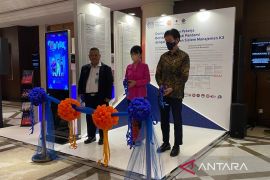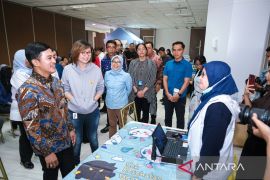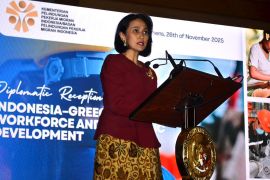I hope that I can gain more important insights to recover from the pandemic, especially improving the K3 at workplaces, so we can protect workers as well as businesses during and post-pandemicJakarta (ANTARA) - The International Labor Organization (ILO) has urged Indonesian companies to ensure occupational safety and health (K3) of workers amid the coronavirus pandemic and after it ends.
“Indonesia is hoping that the pandemic will exit and enter the endemic (phase) in 2022, and we will switch from normal to new normal era. We, however, are still seeking ways to prevent COVID-19 infection from being widely spread. In a bid to prevent the health crises that might occur in the near future, we should ensure the workers doing good actions,” ILO’s manpower specialist, Kazutoshi Chatani, said during a webinar on 'Future Trend of Working World and K3 Post-Pandemic' here on Wednesday.
This is aimed at taking precautionary measures against health crises in the near future, so the country can survive them with the existing health system, he added.
Thus, business players can utilize the new opportunities that emerge during the transition process in the new normal era, he added.
Related news: Taiwan grants entry to Indonesian migrant workers again
“I hope that I can gain more important insights to recover from the pandemic, especially improving the K3 at workplaces, so we can protect workers as well as businesses during and post-pandemic,” he remarked.
The COVID-19 pandemic has quickly changed the world and forced the community to also rapidly respond to changes pertaining to how workers will work in the near future, according to the specialist.
The presence of technology has helped businesses remain on track as well as slashed direct interactions between producers and consumers, he highlighted.
“They can also work from home online, and the vast emerging online delivery services have formed such a new way. We should design a good mechanism, so we can protect more workers,” he noted.
Related news: Minister pushes for providing social security for domestic workers
According to a Katadata survey on the working system during the COVID-19 pandemic, 37.5 percent of workers considered working from home a "success", while 44.3 percent considered it "not so successful", 7.1 percent said it "was not successful", and 11.1 percent said they did not work from home (WFH), he said.
In addition, 40 percent of respondents said the collaboration while working from home was better amid the pandemic, while 20 percent of workers described training or coaching as worse than before the pandemic, he added.
At least 46.8 percent of workers said K3 was prioritized sufficiently, while 39.9 percent said it was prioritized strongly, 11.1 percent said it was not prioritized much, and 2.2 percent said it was not prioritized, he noted.
“The pandemic is a catastrophe, but it is also an opportunity to see and shape our better future,” Chatani remarked.
Related news: Indonesia, Malaysia agree to open border
Related news: Indonesia, Malaysia ink MoU on strengthening news agency ties
Reporter: Juwita Trisna Rahayu
Editor: Fardah Assegaf
Copyright © ANTARA 2021











